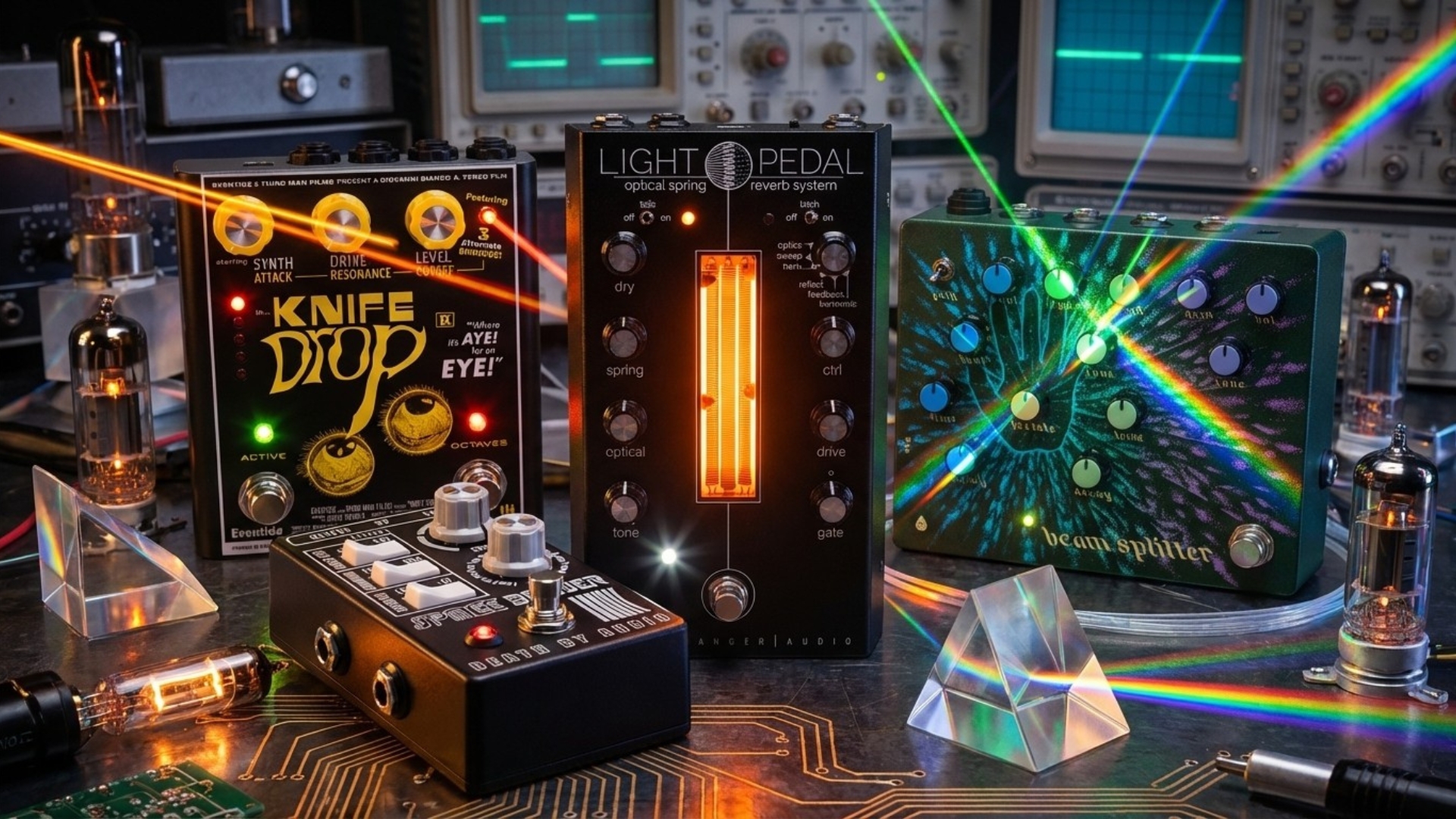“I was about 11 – not old enough to understand how impactful it was. I understood what happened, but music took away the eerie mood”: Ethan Kahn learned to play after a high school shooting – now his band is championed by William DuVall and Rob Halford
The Chained Saint guitarist is learning to balance his SATs with promoting their debut album, but he’s got the support of two rock icons
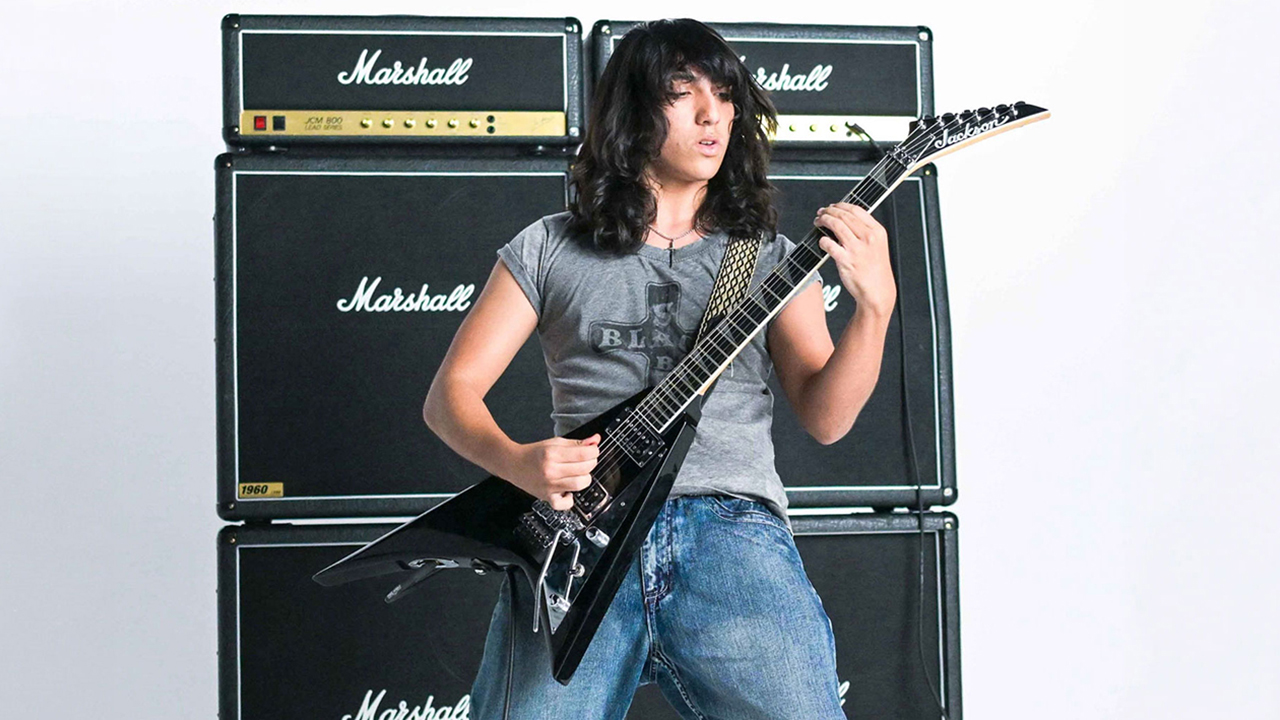
This article is part of Guitar World's series of interviews and features with artists addressing and raising awareness around themes of mental health, particularly as they relate to musicians.
Chained Saint guitarist Ethan Kahn is certain music is good for mental health. “Everyone needs more music in their life, as a way to express themselves and as something that can help them,” he says. “Even if you can’t play an instrument, listening to music still helps. There’s something about the way it impacts your brain, how you think, how you feel. Music helps get you through life.”
For the 17-year-old and his 18-year-old bandmates – bassist Sebastian De Avila, drummer Cameron Cottrell and vocalist Sean Sterling – Chained Saint is about musical and personal expression. Fast, furious, and owing much to traditional metal, the Florida outfit started out in the Kahn family’s garage two years ago.
Debut release Blindside, produced by Alice In Chains’ William DuVall, is earning praise; Judas Priest icon Rob Halford referenced them in a recent interview.
“I heard raw talent and musical sophistication that belied their years,” says DuVall. “Chained Saint combines the best of old-school thrash metal with the energy and modern influences that can only come from being a kid in this day and age. Their music is exciting in its own right – but it’s also potentially creating a path to move the genre forward.
“I recorded and mixed this album to tape because that’s how Chained Saint’s early thrash metal heroes started, and it’s how I started myself. I wanted their first real recording experience to be an opportunity to test themselves on that same proving ground.
“Tape leaves no room for lies. Blindside presents the band exactly as they are and shows the entire world in no uncertain terms that Chained Saint are the real deal.”
All the latest guitar news, interviews, lessons, reviews, deals and more, direct to your inbox!
Kahn, a senior at Marjory Stoneman Douglas High School in Parkland, Florida, was 11 years old when a mass shooting occurred there on February 14, 2018. His older brother, Giancarlo was in the building 15 minutes before the gunfire.
For over an hour the family had no idea as to his whereabouts. He was safe – but the aftereffects on his family sent Ethan turning to music for refuge and healing.
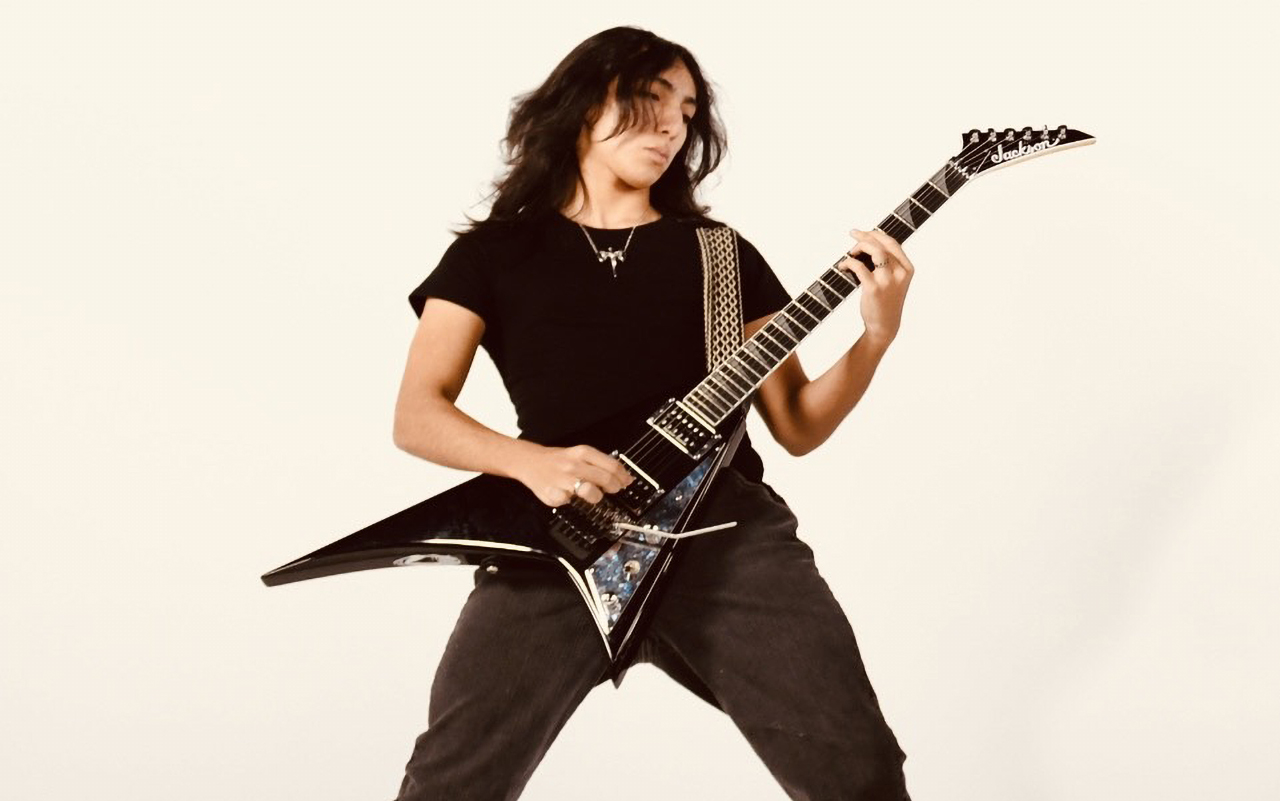
Two years later, in the Covid pandemic, he immersed himself in guitar to cope with the challenges of isolation. So began the journey toward what became Chained Saint.
Is it fair to say that Chained Saint has its roots in the past and present?
“That’s a very good way to put it. We’re very influenced by older music, and a lot of the gear and the way things were done. Not a single line on this record is off any really modern guitars. We’re also influenced by a lot of newer gear and music.
“I play some newer guitars, but for the record we wanted to showcase our roots in the past – mix it with today’s standard of how music is, but also bring it back to how music was.”
What gear did you use on Blindside?
“I brought four guitars to West End Sound Recording in Atlanta, Georgia. But I only used one – for the sake of having a Floyd Rose for solos – because when we saw the rack of gear the studio had available, it was like a candy shop.
“The majority of the guitar sounds are the classic mixture of a Marshall JCM 800 and a Gibson 1960 VOS Les Paul Standard. I used William’s Framus Talisman, a lot of Gibsons, my Kirk Hammett Signature ESP, and a Jackson Rhodes for solo work and lead lines that needed high gain sounds.”
Was there some adjustment to using studio gear instead of your own?
“There was hesitation in the beginning because of how we wrote the songs – very high gain, EMG pickups, lots of chug and straight metal noise. When we did pre-production, I figured I’d give it a shot, use the Gibsons, and go for an open, resonant sound rather than the tight, chuggy sound I was used to.
“The magic really happened when we doubled – and on some tracks tripled – the guitar tracks. It opened my eyes: you don’t need a ton of gain, or to turn your amp all the way up, to sound good. I realized that this gear was the right decision, and I’m very happy with the outcome.”
What did you learn from William DuVall?
“He had a lot of ideas, like with the gear, how we were going to record, how we play, and things like song structure. He’s a big believer in making the songs great – not just the riffs – and in serving the songs. That’s definitely a lesson we all learned from him. But the biggest of all was to know our stuff and always be prepared.”
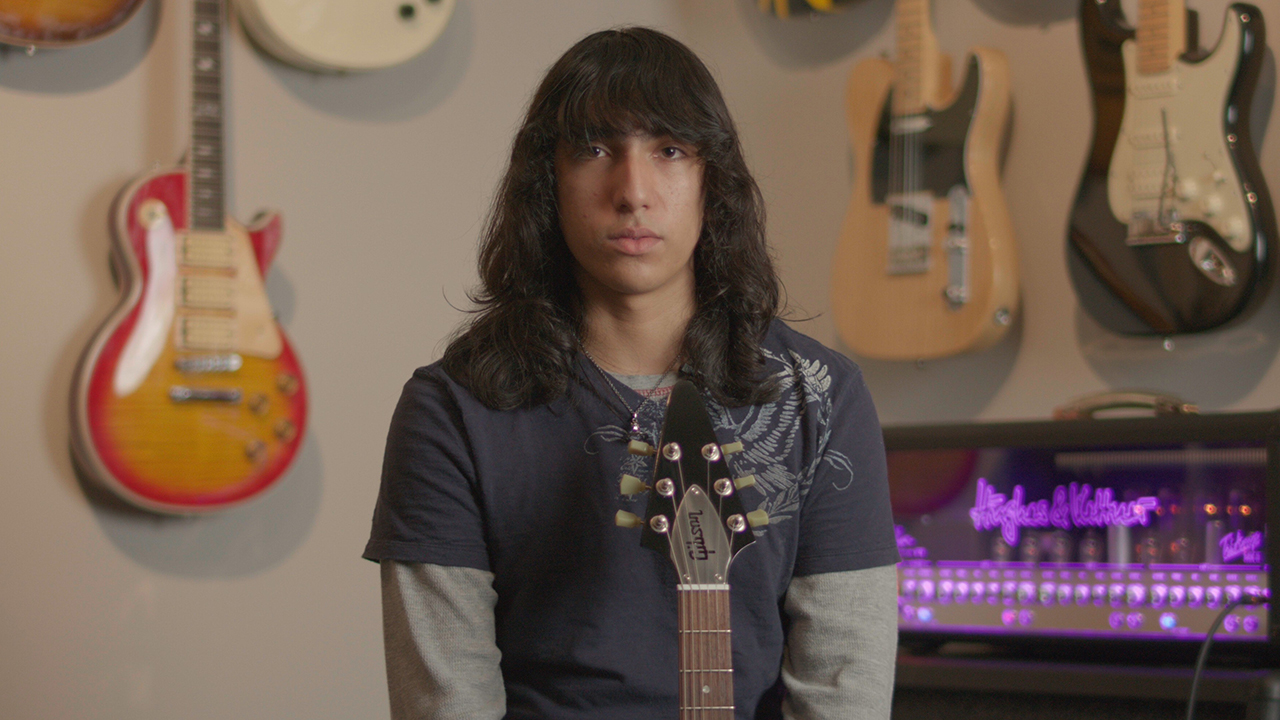
You studied violin at age 6, and at 13 you began playing your brother’s keyboard and guitar.
“He played keyboard in high school, but he wasn’t serious about it. It was more about learning songs he liked at the time, and I picked up on that. Then the pandemic took me from playing instruments as a hobby to a real love for it.
My passion skyrocketed – I became able to describe what I wanted to say with music
“I started playing guitar; I listened to music and watched YouTube videos about music. I played all day, every day. I would be in my Zoom classes, sitting there with the guitar. It got to a point where my parents made me do my Zoom meetings in a different room from my guitars!
“My passion skyrocketed – I became able to describe what I wanted to say with music. I play bass, drums and keyboard, but none of them speak to me like guitar; I can’t express myself as much as I want to on those instruments. Guitar is part of my daily life. I can put my voice out there with the guitar.”
Let’s go back to the incident in 2018.
“I was about 11 – not old enough to understand how impactful it was. I understood what happened, but I didn’t really get the level of where it was. Music took away the eerie, gloomy mood that was set. It definitely helped. When things weren’t sunshine and rainbows in my family, I would go to music, and it helped me grow a better bond with music.
“Going from that to the pandemic, the music I listen to, the music I write, it helps and it’s always there. It’s been life-changing with how I view things and how I express what I see in the world.”
What’s next for Chained Saint?
“I have a record to promote, band practice every week, eight hours of school every day, homework, and in bed at 10 o’clock. I’m very proud of how I’m managing it – I want to make sure that I can balance everything. I feel like if you get into a groove with something, you can do anything,
“Our biggest priority right now is getting back into the local scene, because we took a hiatus to prepare for the record. It makes me happy to see people at school wearing Chained Saint shirts – it’s fulfilling to know they appreciate the work we put out.
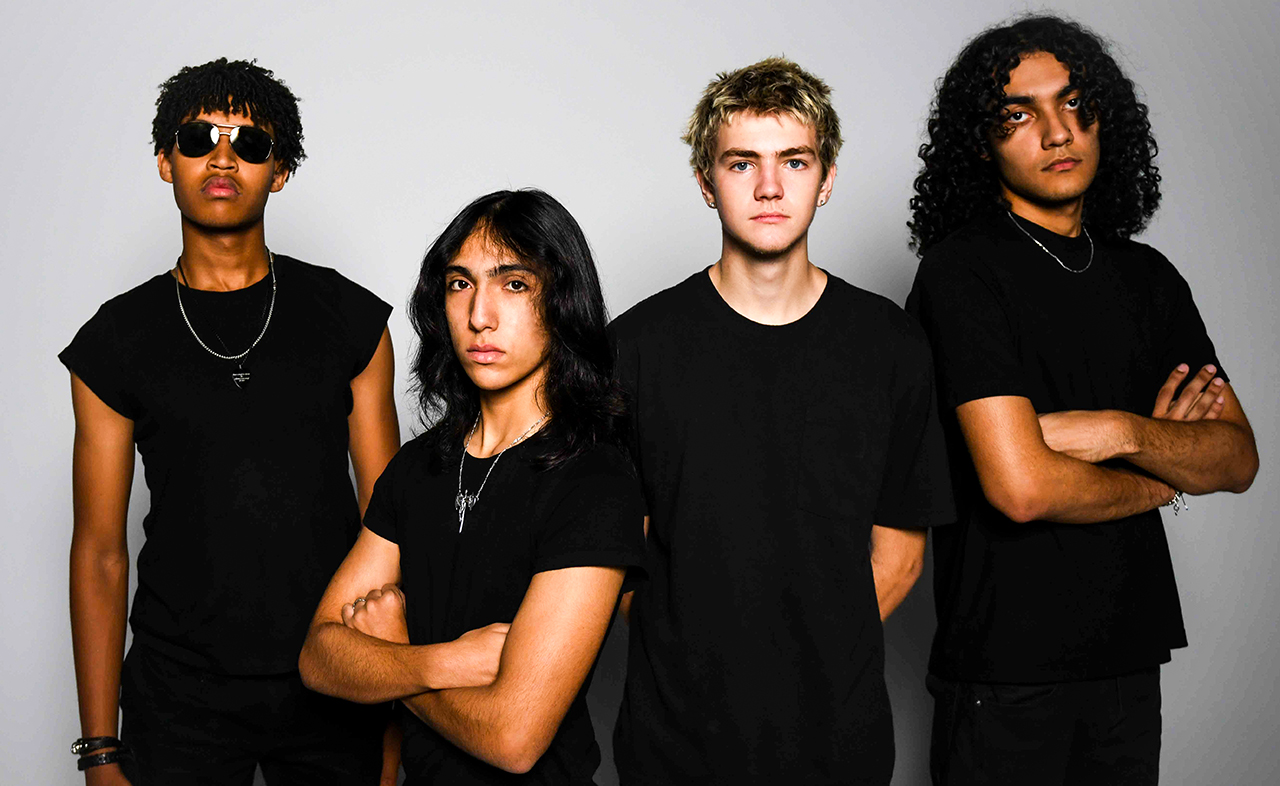
“Touring will be a summer thing. If it were up to us, we’d tour now; but the other guys are in college and I have to focus on high school, SATs, applying to colleges and all these things.
“We like to joke that when I graduate, I’ll walk off the stage in my cap and gown and onto the tour bus. It might happen, because once we have the opportunity, we’ll take it.”
- Find out more at chainedsaint.com.
Mental health resources
- Mental Health America
- Teen Talk App
- WellBeings.org “Hiding In Plain Sight: Youth Mental Illness” documentary
- The Jed Foundation
- Young Minds
- Teen Line
- Youth.gov: Resources to Help Youth Cope after a Mass Shooting
- No Shame on U: Guide – “When Your Child is Experiencing a Mental Health Crisis”
- AAKOMA Project: State of Mental Health for Youth and Young Adults of Color
Alison Richter is a seasoned journalist who interviews musicians, producers, engineers, and other industry professionals, and covers mental health issues for GuitarWorld.com. Writing credits include a wide range of publications, including GuitarWorld.com, MusicRadar.com, Bass Player, TNAG Connoisseur, Reverb, Music Industry News, Acoustic, Drummer, Guitar.com, Gearphoria, She Shreds, Guitar Girl, and Collectible Guitar.


